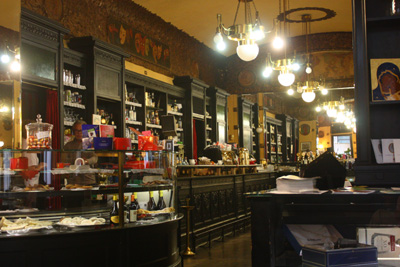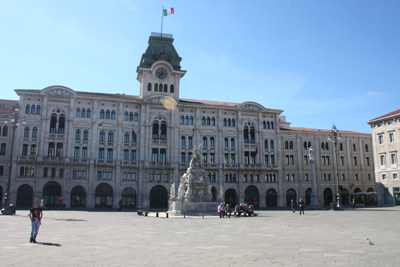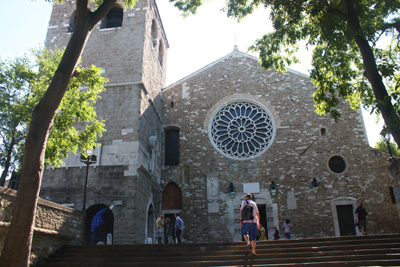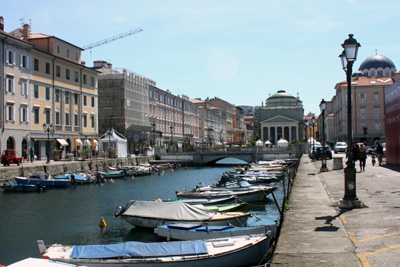 |
 |
Part
3 |
Saturday 28 May 2011
We pass the border crossing between Slovenia
and Italy without any official involvement. On the Italian side we notice
that all place names and road signs are bilingual: Italian and Slovenian.
 In
this part of the country where borders have moved several time over the
centuries, minorities of Slovenes, Croats and Italians live on both sides of
the border.
In
this part of the country where borders have moved several time over the
centuries, minorities of Slovenes, Croats and Italians live on both sides of
the border.
Triest is rainy too. We had booked a room in the
James Joyce hotel, but as we
are a day early they do not have a room available now. They find us a room
in the Urban design hotel next door,
that is run by the same management.
Hyperdesign it is indeed, but the room is a bit on the small side. We make use
of the valet parking service, as parking nearby is not easy. We walk around
town and go for coffee at Cafè San
Marco, a classic coffee house, serving since 1914. It was a haunt
for the local intellectuals, among whom James Joyce, Italo Svevo en Umberto Saba.
Until 1918 it was also a favourite among Italian Nationalists. After sipping
our coffees in the beautiful Jugendstil decor we walk towards the waterfront
for a another drink. The sky clears and the rain stops.
We book a table at restaurant Ai Fiori. Dinner at Ai Fiori
is excellent. It is fish only and very well prepared. We have sea bass and
tuna as our main dishes. A nice pinot gris makes it all even better.
Weather: rain and heavily overcast. 10 degrees in the morning. Clearer
at the end of the day.
Sunday 29 May 2011
We
 have
breakfast in the überstylish breakfast room in the hotel's basement. We head
for the Piazza del’Unitá Italiana (Square of the
Italian Unity). We drink coffee on the south side of the square. The
square is bordered by the town hall on its eastern side.
The western side looks out over the Adriatic Sea. The town hall was finished
in 1873, when Triest was still part of the Austro-Hungarian empire.
The other buildings were built for merchants, shipping and insurance
companies in an era when Triest was the main sea port for Austria. After the
coffee we walk into the old town and climb the hill on which we find the
basilica and the castle of San Giusto. A mass is
being celebrated in the basilica when we arrive. After the mass we go
inside. It is a nice enough church with Romanesque and Gothic elements. Its
present form came about
have
breakfast in the überstylish breakfast room in the hotel's basement. We head
for the Piazza del’Unitá Italiana (Square of the
Italian Unity). We drink coffee on the south side of the square. The
square is bordered by the town hall on its eastern side.
The western side looks out over the Adriatic Sea. The town hall was finished
in 1873, when Triest was still part of the Austro-Hungarian empire.
The other buildings were built for merchants, shipping and insurance
companies in an era when Triest was the main sea port for Austria. After the
coffee we walk into the old town and climb the hill on which we find the
basilica and the castle of San Giusto. A mass is
being celebrated in the basilica when we arrive. After the mass we go
inside. It is a nice enough church with Romanesque and Gothic elements. Its
present form came about when two existing churches were merged into one in the 14th century.
Byzantine influences are visible in the mosaics in the chapels. After the
church visit we see a large group of people coming with children who are
about to receive their holy comunion this morning. They are all dressed up
for the occasion in a special robe. We walk to the castle of San Giuste next
to the church. We
fork out €5 admission for a exhibition on Triest history, the unification of
Italy and the role of the statesman Cavour in it all. There are some
rooms with period furnishings. The main attraction however is the view of
the city!
when two existing churches were merged into one in the 14th century.
Byzantine influences are visible in the mosaics in the chapels. After the
church visit we see a large group of people coming with children who are
about to receive their holy comunion this morning. They are all dressed up
for the occasion in a special robe. We walk to the castle of San Giuste next
to the church. We
fork out €5 admission for a exhibition on Triest history, the unification of
Italy and the role of the statesman Cavour in it all. There are some
rooms with period furnishings. The main attraction however is the view of
the city!
After the visit we descend the hill towards the new city, the
Borgo Teresiano. This area was built during the reign of the
Austrian empress Maria Theresia (1717-1780). We walk to the Canale, a
merchant dock dividing the area in two. Alongside its quays, where now motor
and sailing yachts are moored, there are numerous restaurants and cafés. The dock
ends (or starts) at the Piazza Sant’Antonio Nuovo, where we visit the
beautiful
Serb-Orthodox church, the San
Spiridione. For centuries Trieste has had sizable Serbian and
Greek communities of mostly merchant families. Inside the church we see
worshippers pray and kiss the icons. We head in the direction of the central
railway station. On the square we see the old tram heading for Opicina,
which lies up in the mountains. We have lunch in a family owned restaurant
and walk to the waterfront. It is getting warmer by the hour and it is time
for a siesta back at the hotel.

Around
3.30pm we go out again for a coffee at
Caffè Tommaseo, the
city's oldest coffee house. It was founded by Tomasso Marcato
from Padova in 1831. It was decorated by the painter Gatteri and the mirrors
were especially made in Belgium. In 1997 the café was renovated. At Tomasseo
we get acquainted with a populair Italian drink: Apérol Spritz. A cocktail
of Aperol, Prosecco and
soda water. Finished off with a slice of orange. It is served with generous
servings of crisps, cakes, olives and pretzels. We continue along the
waterfront, where half the city is parading up and down. There is a boat
show with astronomically expensive yachts and there is even a car on show:
the equally expensive Maybach.
Next stop is the
Caffè degli Specchi on the
Piazza del’Unitá Italiana. This café with great outdoor tables on the grand
square is a bit younger than the previous one we visited: it opened for
business in 1839. We enjoy the views, a mineral water and another Aperol Spritz.
At night we have dinner at the deservedly popular Al Barattolo
on the
Piazza Sant’Antonio. Service is fast and correct and the meals are more than
decent at a reasonable price: Sole and beef with salads and deserts. After
dinner we have some coffee at Tommaseo.
Weather: sunny and warm. 24 degrees (75°F)


In
this part of the country where borders have moved several time over the
centuries, minorities of Slovenes, Croats and Italians live on both sides of
the border.
have
breakfast in the überstylish breakfast room in the hotel's basement. We head
for the Piazza del’Unitá Italiana (Square of the
Italian Unity). We drink coffee on the south side of the square. The
square is bordered by the town hall on its eastern side.
The western side looks out over the Adriatic Sea. The town hall was finished
in 1873, when Triest was still part of the Austro-Hungarian empire.
The other buildings were built for merchants, shipping and insurance
companies in an era when Triest was the main sea port for Austria. After the
coffee we walk into the old town and climb the hill on which we find the
basilica and the castle of San Giusto. A mass is
being celebrated in the basilica when we arrive. After the mass we go
inside. It is a nice enough church with Romanesque and Gothic elements. Its
present form came about
when two existing churches were merged into one in the 14th century.
Byzantine influences are visible in the mosaics in the chapels. After the
church visit we see a large group of people coming with children who are
about to receive their holy comunion this morning. They are all dressed up
for the occasion in a special robe. We walk to the castle of San Giuste next
to the church. We
fork out €5 admission for a exhibition on Triest history, the unification of
Italy and the role of the statesman Cavour in it all. There are some
rooms with period furnishings. The main attraction however is the view of
the city!